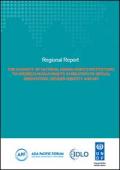Publications - Released in 2013
This Project, Assessing the Capacity of National Human Rights Institutions to Address Human Rights in relation to Sexual Orientation, Gender Identity and HIV (NHRI SOGI Project or the Project), forms part of broader regional collaborative efforts to promote an enabling legal environment for the response to HIV. The NHRI SOGI Project aimed to build understanding of the capacity and response of selected Asian National Human Rights Institutions (NHRIs) to the human rights issues faced by people of diverse sexual orientation and gender identity (SOGI).
In much of Asia, SOGI-related stigma and discrimination strips people of their rights and excludes them from mainstream health programs, public services, and economic opportunity. Stigma and discrimination also have the effect of increasing the acceptability and incidence of violence perpetrated against men and women of diverse SOGI and transgender people. Under these circumstances people of diverse SOGI face ongoing and dehumanizing harm, humiliation and exclusion. Driven underground, people of diverse SOGI are denied the ability to live productive lives as contributing and engaged members of society. Deep set socio-cultural prejudices are exacerbated by punitive and discriminatory legal frameworks, criminalization of same-sex sexual relations in a number of jurisdictions, and law enforcement practices.
Downloads
Organizations
- United Nations Development Programme (UNDP)






